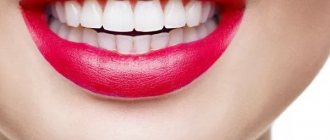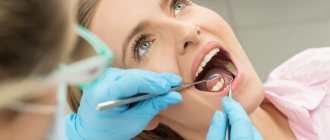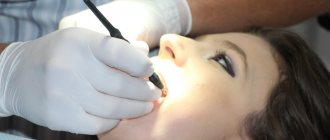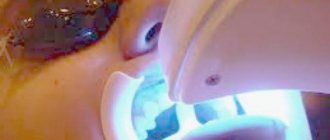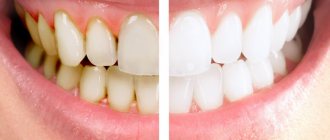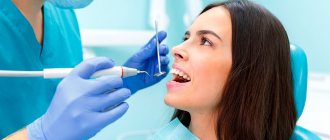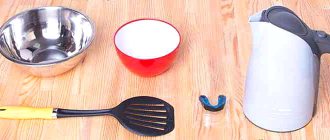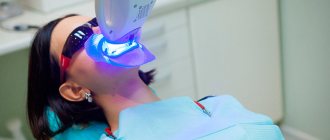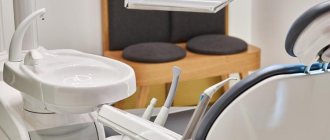Everyone wants to be the owner of a beautiful snow-white smile. This is why professional teeth whitening has become so popular recently. But in order for the result to be maximum and last a long time, you need to follow some rules for oral care. If you do not follow the specialist’s recommendations, fairly soon after the procedure your teeth will return to their previous shade.
Restrictions after the procedure and terms of their observance
As a rule, after the procedure, the specialist gives the patient a leaflet indicating foods and drinks that should be avoided - the so-called white diet. In addition, the leaflet provides general recommendations that must be followed.
The transparent or white diet is a special diet that you need to follow after teeth whitening. Following such a diet will help avoid staining or darkening of lightened enamel.
First of all, the diet implies the exclusion of coloring pigment from the list of foods and drinks consumed. Already from the name of the diet it is clear that it includes light-colored foods.
Ongoing care after whitening
High-quality hygiene. General rules are standard. Brush your teeth twice a day using toothpaste selected by your dentist. Floss is regularly used to clean the cervical part of the crown, lateral surfaces, and interdental space. It is advisable to use an irrigator twice a week to remove soft plaque.
Visits to the dentist. Performed once every 4-6 months for preventive examination and professional cleaning. During visits, the doctor monitors the result of whitening, changes in the color of tooth enamel, and carries out procedures to strengthen it.
Supportive procedures. To consolidate the whitening result and prolong it, do the following:
- professional teeth cleaning. A quick and painless procedure for removing soft plaque, developing tartar, and other deposits on the surface of crowns. It involves polishing the enamel, using enamel strengthening agents, which slows down the penetration of coloring pigments into it, helping to keep teeth white longer;
- instant whitening. Dentists at the DentoSpas clinic recommend Philips Zoom QuickPro lamp-free whitening, which can be performed every few months. It takes 30-40 minutes, lightens teeth by 1-4 shades on the Vita scale, and allows you to either gradually, in a gentle manner, achieve the lightest possible shade, or maintain the result of a previously performed procedure.
Why do you need to eat this kind of food after the procedure?
The fact is that after the procedure the enamel becomes porous and more susceptible, including to dyes. The coloring pigment, which is found in a number of foods and drinks, easily penetrates and is absorbed into the lightened enamel.
In addition, after whitening, the enamel becomes more sensitive, so in the first few days after whitening you should avoid eating sour, hot and cold foods. You should also avoid eating too hard foods.
The most dangerous period is the first two days after the procedure. For the first 48 hours, you must strictly adhere to a white diet, and in subsequent days, consume unwanted foods in minimal quantities.
The longer the restriction from forbidden foods continues, the longer the result of the procedure will be.
Is it safe to whiten teeth?
When choosing competent specialists, carrying out the procedure in a dental clinic, using high-quality whitening systems, taking into account all the patient’s health characteristics, whitening is a safe procedure. In the future, doctors monitor patients during regular preventive examinations.
When properly selected, the whitening composition does not harm the enamel and does not affect the strength of hard dental tissues. Our center’s specialists monitor patients who have had their teeth whitened for at least 5 years. To summarize the observations, we can say that clients tolerate this procedure well and are satisfied with its results.
What is necessary for a positive prognosis after whitening? Individual selection of a modern and safe whitening system, regular preventive examinations after teeth whitening and monitoring of the condition of the oral cavity and the whole body.
Thanks to regular meetings with the patient, it is possible to diagnose this or that pathology in a timely manner, assess the condition of dental tissues, the amount of soft and hard deposits on the enamel, and assess the safety of installed fillings and crowns. This allows you to prevent the development of severe conditions that are dangerous to the patient’s health. Our doctors evaluate the quality and extend the service life of fillings and crowns installed by their colleagues from other clinics.
In some cases, you just need to polish the slightly modified filling, and it will be able to stay in the tooth for another couple of years. If minor defects are not corrected, caries may develop in the filled tooth, and the filling will need to be reinstalled in the future. Also, during preventive examinations, hygienists tell patients how best to care for their teeth in order to avoid the appearance of soft plaque and tartar, which toothpaste and brush is best to use, etc.
Teeth whitening
– a serious procedure, therefore, in the presence of severe concomitant diseases, doctors advise against performing it. Most researchers agree that in the short term, whitening does not cause serious harm to health and does not have any significant negative effect on the condition of teeth and gums. More long-term consequences of exposure to atomic oxygen and peroxide compounds included in bleaching systems require more detailed study. Therefore, a person should make a decision about the need to lighten their teeth carefully and thoughtfully after consulting a doctor and reviewing all available information.
What can you eat
List of healthy permitted foods:
- cottage cheese, milk, low-fat sour cream, yogurt without additives;
- cucumbers, cabbage, potatoes, asparagus, celery;
- green grapes, pears, peeled apples, bananas;
- unleavened cheese;
- clear broth;
- white lean meat;
- seafood;
- white fish;
- mushrooms;
- some types of nuts;
- egg white;
- oatmeal, buckwheat and rice porridge;
- bread;
- pasta without sauce;
- water, clear fruit compote.
Even after 48 hours, experts recommend drinking weak green tea through a straw.
How to keep your teeth white for a long time
The darker a person's skin tone, the whiter their smile appears. It is this fact that explains why the teeth of dark-skinned people appear snow-white to others. We must admit that the natural white color of the dentition is a real gift from nature. However, it is known that only 5% of the world's population have such an impeccable shade of enamel. The rest will have to work hard to get white teeth. To do this, you can use modern methods of care and whitening.
Important! Even after resorting to professional help, it is necessary to maintain the results obtained at home for as long as possible.
What is the secret to keeping your teeth white?
Natural whiteness is an integral component of organ health. To achieve this, you need to:
- promptly treat caries of the entire oral cavity;
- carry out high-quality filling;
- care for and strengthen teeth;
- polish tooth enamel, etc.
If your mouth is healthy, all that remains is to freshen your breath and give your snow-white smile a dazzling, flawless look. Fortunately, the technical equipment and professionals of Crystal Dentistry provide the highest level of service.
Tooth enamel is considered the hardest tissue in the body. It provides thorough chewing and gnawing, and when consuming food or drinks, it exhibits a certain resistance to hot or cold temperatures. However, teeth are located in the oral cavity, they are surrounded by mucous membranes, which are “populated” by millions of bacteria. Daily brushing of teeth at least 2 times a day is a salvation against an army of such “pests”.
Factors that have a detrimental effect on enamel are:
- eating sweet foods that leave plaque on the teeth;
- presence of bad habits (smoking, alcohol);
- frequent consumption of strong drinks (coffee, cocoa, tea);
- fast food abuse;
- frequent consumption of foods high in dyes and preservatives.
If the patient cares about a beautiful smile, the food consumed should be controlled, and oral care should be more thorough.
Features of daily care after whitening
Procedures can be divided into two groups:
- Cleansing teeth and root of tongue from plaque.
Studies show that within 4–6 hours after the “work” of the toothbrush, a soft layer is deposited on the surface of the tooth. If the problem is ignored, it quickly accumulates and turns into a dense coating. The color of teeth becomes dull and deteriorates, since toxins, acids, and potential causative agents of infections and inflammations released by microorganisms are considered the most likely causes of the loss of the healthy appearance of teeth. - Restoring enamel using special toothpastes.
The structure of a healthy organ is 95% composed of strong calcium and phosphorus mineral complexes. The rest is occupied by organic matter and water. In a healthy state, processes of remineralization and demineralization of enamel occur on the surface of the tooth. They are in relative balance. During remineralization, Ca penetrates from food into saliva and then saturates the structure of the surface layers of enamel. During demineralization, acids and bacteria “isolate” the mineral from the surface of the tooth, destroying it. If there is no constant care and cleaning, the latter process begins to prevail, and the tooth enamel loses its structure and changes color.
How to maintain whiteness for a long time after bleaching
It is important to remember not only the quantity, but also the quality of cleaning. Teeth care after whitening should be more thorough. Yellow, soft deposits can be easily removed by regular cleaning, choosing a brush with medium-hard bristles. The procedure should take place within 3 minutes. Dental floss should be used between rows. Don't forget about the rinse aid. If the accumulated deposits cannot be removed on your own, you can resort to professional cleaning and removal of tartar in the clinic.
After the whitening procedure, it is recommended to carry out a course of restorative measures lasting about 1 month. How to keep teeth white for a long time without good restoration? It is advisable to choose toothpaste with sufficient fluoride or calcium compounds. They help strengthen the structure of tooth enamel.
What is the “white diet”
After whitening, the doctor will definitely talk with you and give effective recommendations on how to keep your teeth white for a long time. Among these methods is eating colorless food. The “White Diet” is a list of products that, after lightening, will make up a person’s daily diet. Often, a specialist recommends sticking to it for several weeks after the whitening procedure. The list of selected products includes:
- white meat fish, stewed or baked chicken;
- potatoes, cabbage;
- White mushrooms;
- rice, soy;
- milk, fermented milk products, tofu cheese;
- green apples, pears;
- walnuts;
- wheat bread.
With this diet, the consumption of coloring “irritants” should be avoided. To maintain white teeth, you should exclude: bright vegetables, fruits, red wine, desserts, carbonated drinks, chocolate, artificial sweets, sauces, spices, smoked meats, “quick” soups.
What foods prolong the health and whiteness of teeth?
Strong enamel is the key to a beautiful smile. A proven way to keep it white and healthy is to eat healthy foods. This list includes:
- fresh solid vegetables and fruits (carrots, cabbage, broccoli, apples);
- dairy products rich in calcium (hard cheese, feta cheese, cottage cheese);
- nuts, white and black sesame;
- fresh juices (when consumed through a straw).
Don’t forget about special chewing gums without dye. It is necessary to limit the consumption of sugar-containing products to a minimum.
What not to eat
- Beets, tomatoes, carrots;
- Citrus fruits, watermelon, mango;
- Dark berries;
- Coffee, tea, cocoa;
- Red and rose wine;
- Lemonade, fruit drink;
- Ketchup, soy sauce, etc.;
- Egg yolk;
- Jam, jam;
- Chocolate, candy, caramel;
- Spices and seasonings;
- Chips, crackers;
- Any other foods and drinks containing dye.
Important! If you consume an illegal food or drink, immediately brush your teeth or use mouthwash.
Teeth whitening prices
| Name of service | Price |
| Teeth whitening with Philips ZOOM 4 Prepare your teeth whitening properly and you won't be disappointed with the results. Find out how to prepare for teeth whitening, what whitening methods exist and how to do in-office whitening Philips ZOOM | 28000 ₽ |
| Teeth whitening with the Opalescence Xtra Boost system Unlike Philips ZOOM, the Opalescence Xtra Boost system whitens teeth without the use of a special lamp. Find out more about the effective teeth whitening with Opalescence Xtra Boost | 13000 ₽ |
| Intracoronal bleaching (one session) Depulped (dead) teeth that have darkened after nerve removal can only be whitened using intracoronal bleaching. | 2200 ₽ |
| Teeth whitening with a Doctor Smile diode laser. The Doctor Smile diode laser is a unique equipment with a wide range of capabilities. The laser is used in the treatment of root canals of teeth, to treat gum disease, during surgical operations and to activate a special gel during the whitening procedure. | 22000 ₽ |
| Whitening with Doctor Smile diode laser (1-2 teeth) | 3300 ₽ |
| Whitening with Doctor Smile diode laser (5 teeth) | 6600 ₽ |
| Home teeth whitening with Philips ZOOM Day White / Nite White system | 7700 ₽ |
| Home teeth whitening with Opalescence Patient Kit | 10600 ₽ |
| Manufacturing of individual trays for the upper and lower jaws for home whitening procedures | 5300 ₽ |
Sample menu for the week
Smile-safe food plan for the first weeks after whitening [3]:
| Days | Breakfast | Snack | Dinner | Dinner |
| 1st and 4th | Oatmeal with milk, cottage cheese, raisins, fermented baked milk. | Yogurt, banana. | Two boiled eggs, green tea with milk, cottage cheese with sour cream. | Cookies, yogurt. |
| 2nd and 5th | Rice porridge with honey, yogurt. | Sandwiches with butter and cheese, yogurt. | Mushroom cheese soup, steamed white meat with vegetables. | Banana, yogurt. |
| 3rd and 6th | Vermicelli porridge with milk, cottage cheese. | A handful of nuts, two boiled eggs. | Noodle soup, boiled potatoes with chicken. | Ryazhenka. |
| 7th | Semolina porridge with milk and butter. | White grapes, peach, peeled apples. | Boiled or baked fish with a side dish of steamed cauliflower. | Salad of peeled cucumbers or light, non-acidic fruits. |
List of sources:
- Burak J. Why teeth darken and how to restore their whiteness, portal “Healthy People” (24health.by), 2021 // URL: https://health.tut.by/news/disease/692875.html (access date: 02.11.2020).
- 10 facts about teeth whitening. Doctor's opinion. ONDOC, 2021 // URL: https://ondoc.me/blog/posts/9 (access date: 12/01/2020).
- Bolotina T.A. White diet after teeth whitening. Blog of practicing dentists DentConsult, 2021 // URL: https://dentconsult.ru/otbelivanie-i-chistka/belaya-dieta-posle-otbelivaniya-zubov.html (date of access: 02.11.2020).
- Vovilyuk A.L. Diet after teeth whitening. Dental portal “Anatomy of teeth”, 2005 // URL: https://yandex.ru/turbo/anzub.ru/s/esteticheskaya-stomatologiya/dieta-posle-otbelivaniya-zubov/ (date of access: 02.11.2020) .
Indications and contraindications
Doctors at the Restavraciya dental clinic recommend whitening only if you have absolutely healthy teeth. The procedure is suitable for the following categories of patients:
- age-related changes;
- smokers with many years of experience;
- for those who are unable to give up carbonated drinks and sweets, or the use of coloring products;
- teeth that are affected by mild or moderate fluorosis;
- desire to improve the aesthetic appearance of a smile.
Professional whitening in a clinic has some contraindications:
- cracks or microcracks of enamel;
- increased tooth wear;
- caries of any stage;
- patients have braces;
- stomatitis;
- increased sensitivity of teeth;
- increased sensitivity to whitening components;
- age under 18 years;
- period of pregnancy and lactation;
- taking tetracycline drugs;
- exposed necks of teeth;
- periodontal disease in the acute stage.
If a patient is diagnosed with caries, stomatitis, periodontal disease or another dental disease, the dentist will initially treat the primary disease.
